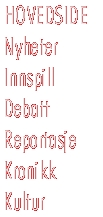
|
|
Redaktør: Teknisk ansvarlig:
|
|
Spørsmål angående engelsk
kan stilles til språkrådgiver Stewart Clark, Studieavdelingen,
e-post: stewart.clark@adm.ntnu.no, To many young people, house has become the name associated with extended partying, hypnotic lights and music and a life style. House party however also has another traditional meaning - a group of people staying in a country house for a few days. In parliament in London, the House (capitalized ) means either the House of Commons or the House of Lords. In the USA, the same term usually means the House of Representatives. House (Norw. hus) is a dwelling or a structure in which people live. A house can be detached (Norw. enebolig) or semi-detached in BE, duplex in AE (Norw. tomannsbolig), or terraced (Norw. rekkehus): «You can sell a house, but not a home». House is more widely used in BE, than in AE where home is common. Home (Norw. hjem) can be any kind of building: a flat, a log cabin or even a hotel. However, it is not the building but the associations that are important as home makes people think of warmth and security. Consequently, estate agents talk about homes for sale, even though this is illogical. A house is saleable, a home is not. Finally, what is House style? This is the preferred way
fight, battle, struggle, strides, match If one is concerned with physical conflict, here are some alternatives: Fight (Norw. kamp, krangel) means a limited combat between two boxers or aircraft or more widespread, like the fight for survival, the fight against poverty. Battle (Norw. slag, kamp) can mean major military actions like the Battle of Britain and minor struggles: «I cannot fight all your battles with your teachers». Struggle (Norw. kamp) means a variety of different minor battles: «The struggle for independence from Britain». Strides is a word to treat with care as the Norw. term
«strides» is a false friend and is far away from the
English term strides. Suitable translations of Norw. strides include
Then there is «match» as another translation of the Norw. kamp: Match can mean a sporting event: «The TV programmes collided and there was both a football match and a top tennis match». In tennis, the results are based on the game, the set and the match order. Enlightening Norwenglish An old lady was given the job of parking attendant in the north of Norway. The story goes that she scared away all the foreign tourists by her version of the prices: «One time NOK 20, three time NOK 50». Three Norwegians were in a small English town and stopped a taxi. Two got in the back, Olav, the third one, opened the front door to the astonishment of the driver. When he realized he had opened the door on the wrong side, Olav explained to the driver «I am sorry, in my country the rat is on the other side». Dagbladet had an article about the actor Russel Crowe who mentioned
that he liked to sit as near to an emergency exit as possible
when travelling by plane. His explanation was that this made it
easy for him «to piss off» if something happened.
|

 Stewart's
Corner
Stewart's
Corner